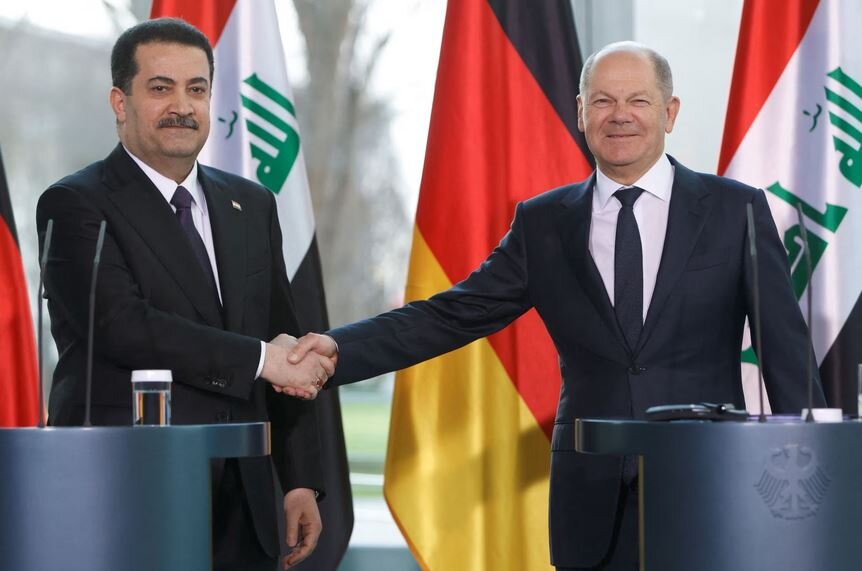In order to replace Russian gas and diversify its imports, Germany has turned towards energy contracts with Iraq. Since cutting off Russian energy exports, Germany has held talks with the United Arab Emirates, Qatar, the United States, Canada, Norway and other potential gas suppliers. German chancellor, after meeting with the new Iraqi Prime Minister Mohammed Shia al-Sudani in Berlin, said Iraq will be a very good partner for Germany for the import of gas and oil to that country. On the other hand, in order to provide long-term energy security based on the macro-energy policies of the European Union, Germany is trying to become a regional energy center and play a role in the distribution of electricity and gas through Germany to other European countries.
Strategic importance of energy
Access to energy resources is also related to geostrategic issues and issues of regional dominance. The Middle East and Central Asia region have abundant gas and oil reserves. Since energy demand is increasing not only in the industrialized countries of Europe and the US, but also to a significant extent in countries such as South Korea, Japan, China and India, competition for strategic access to oil and gas reserves in Iraq and other countries of origin is increasing, which especially affects countries that are heavily dependent on energy imports.
Iraq’s energy sector
The official visit of Iraqi Prime Minister Mohammed Shia al-Sudani to Berlin shows his political and economic priority for Europe, especially for Germany. According to the International Energy Agency, that country is the fifth largest oil producer and is heavily dependent on oil revenues. At the end of 2021, Iraq’s natural gas reserves were the twelfth largest in the world with about 131 trillion cubic feet. Iraq seeks to make key developments in the fields of oil and especially gas in order to reduce import dependence on Iran. At the same time, establishment of unstable governments in Iraq, and the pressures of Riyadh and Washington on the country to reduce political, religious, economic and military relations with Iran have not been ineffective in Iraq’s motivation to reduce its dependence on imports from Iran; in this regard, reference can be made to the opening of Basra Gas Company to speed up completion of the “LNG” terminal. On the other hand, currently, the Iraqi government is trying to reduce its economy from its heavy dependence on oil, like other pioneering countries in the Persian Gulf region. It is possible that since the country is planning to increase oil production, Iraq’s production will increase by 1.3 million barrels per day by 2030, which will put the country in the third place in the world oil supply at that time.
Challenges, prospects
Although according to the estimates of the International Energy Agency, increase in Iraq’s oil production capacity in the last decade has been significant, at the same time, in terms of the development and discovery of energy resources, the territory of Iraq may be one of the few countries whose known hydrocarbon resources has not yet been fully exploited. One of the main reasons is the instability and political differences in Iraq and its effects on adherence to international agreements and contracts. It is worth mentioning that oil production in the northern region of Iraq by the Kurdistan Regional Government is shaky and unstable due to major differences with the central government in governance issues, especially in the oil and gas sector. Also, growth of domestic consumption demand, the liquidity crisis in Iraq and even parameters such as the mainly mountainous geography of the region, especially in the north of Iraq, the high cost of developing its reserves, creation of the pipeline infrastructure needed for transfer of the produced gas to the target markets, unavailability of water and the need to the planned energy (oil) production to a higher level of water production and lack of necessary infrastructure in this field are among the major challenges of energy development in that country.
Therefore, despite the huge oil and gas reserves, the country is dependent on imports to meet its energy needs, and Iraq’s current plan in the energy sector is to focus on investing in gas and oil fields in order to operate power plants. However, it should not be overlooked that the reality of Iraq’s oil and gas energy industry indicates that despite the imposition of oil sanctions against Russia, which has increased the number of Iraqi oil and gas customers, and despite providing investment opportunities, due to poor infrastructure and logistics and political and security instability, the country will continue to import fuel for the next 10 years and will not be able to play a significant role in the export of energy.










0 Comments